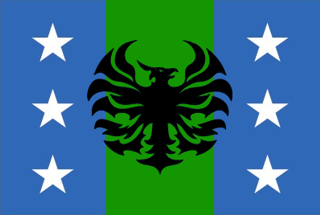Difference between revisions of "Wingarde"
| Line 12: | Line 12: | ||
== History == | == History == | ||
| + | |||
| + | === Early History (~1000 BC - 1879 AD) === | ||
Archaelogical research on the islands suggests that a primitive, chieftain-based society settled Wingarde Archipelago over 3,000 years ago. The early natives excelled in agricultural and fishing activities. The tribes gradually developed a religious system, which primarily worshipped the sun and the hawk as its messenger, and stable economy. They prospered peacefully and isolated from the rest of the world for over 2,500 years. | Archaelogical research on the islands suggests that a primitive, chieftain-based society settled Wingarde Archipelago over 3,000 years ago. The early natives excelled in agricultural and fishing activities. The tribes gradually developed a religious system, which primarily worshipped the sun and the hawk as its messenger, and stable economy. They prospered peacefully and isolated from the rest of the world for over 2,500 years. | ||
Revision as of 16:17, 24 August 2005

| |
| Flag of Wingarde | |
| Motto: "Acta non verba." | |
| No Map Available Yet | |
| Region | Wingarde Archipelago |
|---|---|
| Capital | Stromburg |
| Official Language(s) | German, English |
| Leader | Hermann Jakob |
| Population | Under 50 million (August 2005) |
| Currency | Talon |
| NS Sunset XML | |
History
Early History (~1000 BC - 1879 AD)
Archaelogical research on the islands suggests that a primitive, chieftain-based society settled Wingarde Archipelago over 3,000 years ago. The early natives excelled in agricultural and fishing activities. The tribes gradually developed a religious system, which primarily worshipped the sun and the hawk as its messenger, and stable economy. They prospered peacefully and isolated from the rest of the world for over 2,500 years.
Diverse European explorers discovered the archipelago around the 16th century. The Spanish eventually claimed sovereignty over the islands, but disregarded settling it given the fact that natives showed hostility against foreigners, and Spain currently couldn't afford taking them by force.
A major revolution took place not long after the encounter with the Europeans, apparently for religious purposes. The religion, and society with it, crumbled because one of its main pillars was that there was supposedly nothing beyond the islands. The arrival of foreigners inevitably destroyed that belief. The prosperous native empire shattered and every settlement became independent, reluctant to trust each other.
Germanic Period (1879 - 1914)
Around the middle of their colonial expansion, the Germans arrived at the archipealgo in 1879. The explorers found the weak natives to be not much of a threat. Even though they offered resistance, their wooden spears were no match for modern rifles. The descendants of the ancient native empire were quickly defeated, the scarce survivors integrated to the islands' new population, which settled them in 1881. The lands were deemed Wingarde by their new inhabitants.
The Germans thoroughly developed the islands, harvesting the land, exploiting its resources and building most of Wingarde's current major cities. Stromburg, the current capital, was the first settlement built by the pilgrims. Governed by the German Empire, the archipelago successfully prospered until World War I broke out in Europe.
British Period (1914 - 1946)
In 1914, all of the German colonies in the Pacific were taken by Germany's enemies. British forces seized control of the Wingarde Archipelago after defeating the puny garrison defending it, and claimed sovereignty over the islands in the name of the Queen.
The now British colony kept thriving despite having lost its first fatherland. A strong, intensive program to establish English as the archipelago's main language was carried out. The teaching of English was compulsory in schools. The new government also attempted to remove German as a subject from the educational institutions, but this measure faced severe opposition by part of the population, and was ultimately abandoned to prevent civil unrest. Despite the educational measures, German remained the main language of the islands, with English as the secondary one.
The British government further industrialized the Wingardian territories, introducing extensive railroads, building large ports and improving the mines established to exploit the recently-discovered iron deposits in the mountains of the island of Wernover.
During World War II, Wingarde proved to be a strategic point in the Pacific. The Japanese repeatedly tried to take over the islands, but were repelled by their stout defenders and elements of the Royal Navy in every single attempt made. Japan eventually refrained from launching further assaults on the archipelago as the war went on and the balance tilted in favour of the Allies, and concentrated its military efforts to fighting the Americans, who were advancing dangerously into Japanese territory.
To be continued...
National Emblems
Flag
The main national emblem, the hawk on the center of the flag, symbolizes the light and Heavens, below whom the nation was founded, and the power and watchfullness of the Wingardian people. The central green pale describes the evergreen plains and forests of the nation's islands. The blue pales stand for the sapphire waters of Wingarde, the rivers and the sea that surrounds the nine islands. Finally, the six stars represent the six island-states of Wingarde.
Animal
Coming soon...
Tree
Coming soon...
Politics
National Government
Coming soon...
Armed Forces
Coming soon...
Geography
Territory
Coming soon...
States
Coming soon...
Climate
Coming soon...
Society
Demographics
Coming soon...
Religion
Coming soon...
Education
Coming soon...
